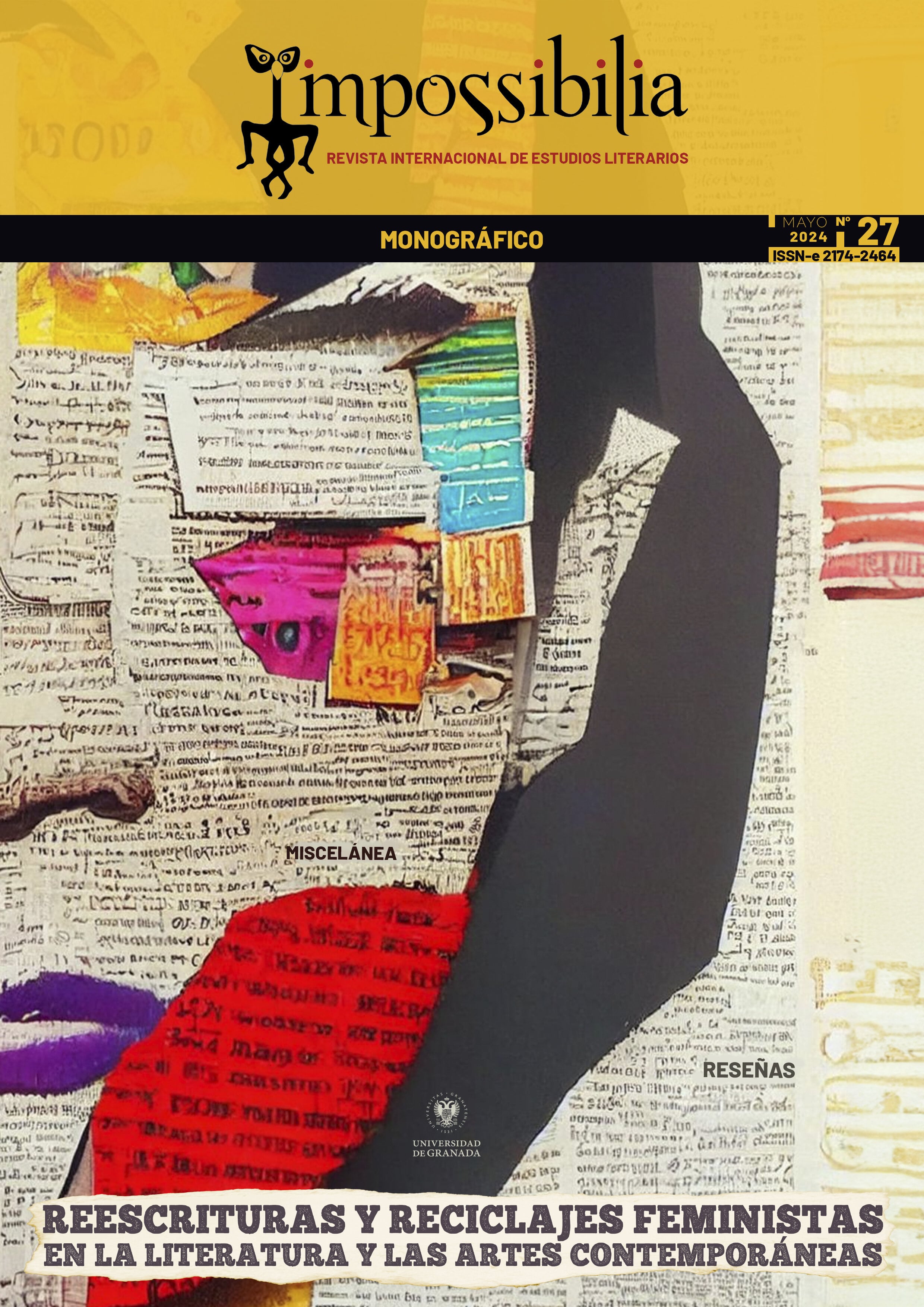Reescritura feminista de la violación de Lucrecia: de Shakespeare a Angélica Liddell
DOI:
https://doi.org/10.30827/impossibilia.272024.29500Palabras clave:
Mitocrítica, Literatura comparada, Feminismo, Shakespeare, Angélica Liddell, LucreciaResumen
La violación de Lucrecia ha sido una historia reelaborada en muchas obras artísticas. Una de estas reelaboraciones es la de Angélica Liddell, que parte de la de Shakespeare como hipotexto. Por tanto, el objetivo de este artículo consiste en apreciar las alteraciones que Liddell ha realizado de este mito mediante un estudio comparado y mediante el uso de la mitocrítica y de la crítica feminista. Este proceder ha desvelado que ―subvirtiendo los mitemas, los recursos estilísticos y los tópicos― la escritora desestima la visión premoderna de la violación a favor de una visión moderna que posibilita la agencia de las mujeres violadas. Además, critica los esquemas de virtud que ciñen a las mujeres a un marco opresivo.
Descargas
Citas
ANDERSSON, Ulrika; EDGREN, Monika; KARLSSON, Lena; & NILSSON, Gabriella (Eds.) (2019). Introductory Chapter: Rape Narratives in Motion. Rape Narratives in Motion (1-16). New York: Palgrave Macmillan.
BEARD, Mary (2017). SPQR. Una historia de la antigua Roma (trad. FURIÓ, Silvia). Barcelona: Crítica.
BELSEY, Catherine (2001). Tarquin Dispossessed: Expropriation and Consent in “The Rape of Lucrece”. Shakespeare Quarterly, 52(3), 315-335.
BETETA, Yolanda (2009). Las heroínas regresan a Ítaca. La construcción de las identidades femeninas a través de la subversión de los mitos. Investigaciones feministas, (0), 163-182. Disponible en: https://core.ac.uk/reader/38817030
BRIGLEY, Zoey; & GUNNE, Sorcha (Eds.) (2010). Introduction: Feminism without Borders, The Potentials and Pitfalls of Re-theorizing Rape. Feminism, Literature and Rape Narratives: Violance and Violation (1-20). Nueva York: Routledge.
CATTY, Jocelyn (Ed.) (2011). Writing Rape, Writing Women in Early Modern England: Unbridled Speech. Nueva York: Palgrave Macmillan.
DESPENTES, Virginie (2007). Teoría King Kong (trad. PRECIADO, Beatriz). S.l.: Melusina.
EGUÍA, Jesús (2013). Motivos y estrategias en el teatro de Angélica Liddell. Teatro: revista de estudios culturales, (27). Disponible en: https://cutt.ly/9wItTvUM
EISAMAN, Katharin (1986). Taking Tropes Seriously: Language and Violence in Shakespeare's Rape of Lucrece. Shakespeare Quarterly, 37(1), 66-82.
GARNIER, Emmanuelle (2012). El “espíritu de lo grotesco” en el teatro de Angélica Liddell. Signa, (21), 115-136. Disponible en: https://cutt.ly/ZwItUrRd
GASPARÍN, María Florencia (2012). Notas sobre la propiedad y la desposesión, lo propio y lo inapropiado en La violación de Lucrecia. Comunicación presentada al VIII Congreso Internacional Orbis Tertius de Teoría y Crítica Literaria. La Plata. Disponible en: https://www.aacademica.org/000-088/89.pdf
GÓMEZ, Pedro (1976). La estructura mitológica en Lévi-Strauss. Teorema: revista internacional de filosofía, 6(1), 119-146. Disponible en: https://cutt.ly/AwU8XEj3
GREEN, Joyce (1994). Speech, Silence, and History in “The Rape of Lucrece”. Shakespeare Studies, (22), 77-103.
KUNAT, John (2015). Rape and Republicanism in Shakespeare's “Lucrece”. Studies in English Literature, 1500-1900, 55(1), 1-20.
LASA, Cecilia (2017). Poetizar el dolor de la mujer en la Modernidad temprana inglesa: política de la forma en La violación de Lucrecia, de William Shakespeare. Babedec, 7(13), 405-425. Disponible: https://cutt.ly/uwItOWFa
LIDDELL, Angélica (2015). You Are My Destiny (lo stupro di Lucrezia). En LIDDELL, Angélica. Ciclo de las resurrecciones (43-55). Segovia: La Uña Rota.
LOUREIRO, Katherine Elizabeth (2019). Una aproximación a la poética teatral de Angélica Liddell. Siglo XXI. Literatura y cultura española, (17), 61-80. https://doi.org/10.24197/sxxi.0.2019.61-80
MCLEAN, Kate C.; SHUCARD Hannah; & SYED, Moin (2017). Applying the Master Narrative Framework to Gender Identity Development in Emerging Adulthood. Emerging Adulthood, 5(2), 1-13. https://psycnet.apa.org/doi/10.1177/2167696816656254
MOYA, Francisco (1995-1996). El romance de Tarquino y Lucrecia. Miscelánea medieval murciana, 19-20, 233-244. Disponible en: https://cutt.ly/rwItSwGx
NEWMAN, Jane O. (1994). “And Let Mild Women to Him Lose Their Mildness”: Philomela, Female Violence, and Shakespeare's The Rape of Lucrece. Shakespeare Quarterly, 45(3), 304-326.
ROCAMORA, Raquel y CEBRIÁN, Juan Antonio (2021). La locura de amor en la Lucrecia de Nicolás Fernández Moratín. Tycho, 7, 123-135. Disponible en: https://cutt.ly/ewItEsCo
SANYAL, Mithu M. (2019). Aspectos de un crimen, de Lucrecia al #MeToo. Barcelona: Reservoir Books.
SEGATO, Rita (2017). La estructura de género y el mandato de la violación. En SANTIAGO, Alejandra de; CABALLERO, Edith; & GONZÁLEZ, Gabriela. Mujeres intelectuales: feminismos y liberación en América Latina y el Caribe (299-331). Buenos Aires: CLACSO. Disponible en: https://cutt.ly/kwItWcSB
SHAKESPEARE, William (2015). La violación de Lucrecia: un poema narrativo (edición bilingüe) (trad. RIVAS, José Luis). Madrid: Vaso Roto.
TORRE, Carlos de la (2017). The Rape of Lucretia: de heroína clásica a contralto contemporánea. Revista ITÁLICA, 2(3), 45-62. https://cutt.ly/gwU8SZ2Y
VALDERRAMA, Mara. (2023). Esperpento y cuerpo violento: Angélica Liddell entre misoginia y feminismo. Acotaciones, (50), 99-122. https://orcid.org/0000-0003-0695-2515
Publicado
Cómo citar
Número
Sección
Licencia
Derechos de autor 2024 Impossibilia. Revista Internacional de Estudios Literarios

Esta obra está bajo una licencia internacional Creative Commons Atribución-NoComercial-SinDerivadas 4.0.















